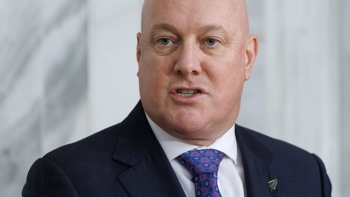
National leader Christopher Luxon and finance spokeswoman Nicola Willis have unveiled a $14.6 billion tax cut policy - a far larger plan than expected.
The party promises to pay for the plan with about $8.4b of cuts and $6.2b of revenue increases, including taxing foreign buyers (after National ends the foreign buyers ban for some homes), taxing online gambling, and raising charges on some visas.
Luxon said the plan would target the “squeezed middle” by lifting income tax brackets to compensate for inflation. The party has called it a “Back Pocket Boost”.
The big change comes from shifting tax thresholds. This is an effective tax cut as it means people will have less of their income taxed at higher rates.
The $14,000 threshold will rise to $15,600; the $48,000 threshold will rise to $53,500 and the $70,000 threshold will rise to $78,100.
The plan does not significantly help people who are earning at the bottom end of the income scale with the bottom threshold raised by just $1,600, however, the large adjustment to the $48,000 bracket will be significant for middle-income earners.
Below $48,000, income is taxed at 17.5 per cent - this jumps to 30 per cent for income earned above $48,000. Shifting this threshold will lead to quite large savings for people earning above that threshold.
Those changes will mean tax cuts to earners. Someone earning $60,000 will get an extra $50 a fortnight. A household on $120,000 without children would get $100 a fortnight and an average income household with children would get $250 a fortnight.
A superannuitant couple would get $26 a fortnight.
“New Zealand should be a country where if you work hard, you can get ahead. But after years of economic mismanagement by Labour, topped off by two years of rampant inflation, huge increases in interest rates, and a shrinking economy, most Kiwis are going backwards,” Luxon said.
“Hope and help are on the way,” he said.
“National’s Back Pocket Boost tax relief plan will increase after-tax pay for the squeezed middle, making a family with kids, on the average income of $120,000, up to $250 a fortnight better off, and an average-income child-free household up to $100 a fortnight better off,” he said.
The party is expanding working for families and expand some tax credits, which target tax relief.
The plan includes four main tax changes, three of which trigger on July 1, 2024.
These are:
- Shifting income tax brackets to compensate for inflation
- Expanding tax credits to reach more modest income earners
- Introducing the FamilyBoost childcare tax credit
- Increasing Working for Families tax credits for working families (from April 1, 2024). These are the same as what Labour has promised. National will increase the In-Work Tax Credit by $25 from $72.50 to $97.50 and lift the abatement threshold to $50,000 in 2026, again the same as Labour’s plan
Against expectation, the party has opted to have all of the main changes trigger at the first budget after the election, with the interest deductibility changes and Working for Families changes triggering earlier - the current fiscal year.
The interest deductability changes will be phased out from the 2023/24 Budget until they are fully phased out by 2027/28, costing $2.1 billion over the forecast period.
This contributes to the massive cost of the plan - $14.6b.
The party reckons a Foreign Buyer Tax would bring in about $700m. The party says it will keep the foreign buyer ban for homes worth less than $2m.
Homes worth more than $2m could be sold to foreign buyers but these would be taxed at 15 per cent.
Willis said the cost of the plan would be paid for through some spending cuts and tax hikes.
The spending cuts include:
- $594m on average per year reduction in spending on “back-office functions in government departments”, excluding non-core and frontline agencies - this would come on top of Labour’s cuts announced on Monday.
- $400m on average per year reduction in government spending on consultants - this would come on top of Labour’s cuts announced on Monday.
- $590m on average per year “Climate Dividend”, this will take money from the Emissions Trading Scheme, which taxes polluters and funnel it towards households. Currently that money is ringfenced for projects funding emissions reductions
The tax hikes include:
- $740m from a 15 per cent foreign buyer tax on purchase of houses worth over $2 million
- $525m on average per year from ending the commercial building depreciation tax break
- $179m on average a year from taxing online gambling/ Labour has itself looked at closing the loophole for online gambling, but reckons it is difficult
- $123m on average per year from moving to user-pays immigration levies, excluding tourist visas
The tax plan does, as promised, target middle-income earners.
National would increase eligibility for the Independent Earner Tax Credit, which gives $10 a week to middle-income earners.
The cut-off threshold for the tax credit would lift from $48,000 to $70,000, meaning more people would earn the tax credit, boosting incomes by $10 a week. The party thinks it would benefit 380,000 Kiwis.
Willis said the plan was not inflationary because every tax cut was paid for by a spending cut or a tax increase.
The party said economics consultancy Castalia had verified its costings.
“We are very confident in our numbers,” Luxon said.
The party took some heat for dedicating such a large amount of the plan to tax cuts for landlords, via rolling back the bright line test to 2 years and phasing in interest deductability for landlords.
Luxon said he was confident these changes would put downward pressure on rents, although a recent paper from the Housing Technical Working Group - a group comprised of Treasury, the Reserve Bank, and the Ministry of Housing and Urban development was sceptical these policies were having a large impact on rent increases.
Thomas Coughlan is Deputy Political Editor and covers politics from Parliament. He has worked for the Herald since 2021 and has worked in the press gallery since 2018.
Take your Radio, Podcasts and Music with you









